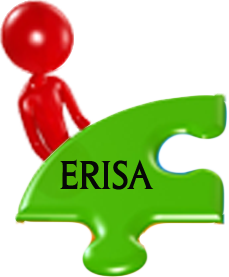Employment laws can be confusing and downright scary.
They don’t have to be. As a public service, from now until my special Halloween webinar Answers to the World’s Scariest Employment Law Questions, I’ll be tackling each major law one by one to give you what you REALLY need to know. By the end, you’ll have handy one-page cheat sheets for each and every law and your terror level will be reduced to zero.
Today’s Topic: ERISA
Here is basically everything you need to know about the Employee Retirement Income Security Act (ERISA) in one handy post.
ERISA CHEAT SHEET
What employees are covered?
All employers that offer “employee benefit plans” to their employees.
What’s an “employee benefit plan?”
Either:
- Employee Welfare Benefit Plan — a plan or fund through which an employer or employee organization provides participants with health care coverage;
- Employee Pension Benefit Plan — a plan or fund through which an employer or employee organization provides participants with retirement income, or provides for deferred income.
What’s required?
Certain minimum standards for both types of plans regarding employee and beneficiary participation, funding, administration, benefit accrual, disclosure, survivor benefits and plan termination.
Who’s eligible to participate in pension plans?
In general, employers must allow every employee who is at least 21 years old and has worked for at least 1,000 hours over the last 12 months to participate.
What kinds of pension plans are there?
- Defined benefit plan — promises a specific monthly benefit upon retirement (or retirement age);
- Defined contribution plan — employer and/or employee contributes to plan during employment and employee receives the balance upon retirement (or retirement age).
What are an employer’s notification requirements?
- Summary plan description to each participant;
- Summary of the plan’s annual financial information to each participant;
- Annual accounting of the benefits earned by each participant;
- Copy of the plan upon a participant’s request.
What are the potential penalties?
- Outstanding plan benefits;
- Civil and criminal fines;
- Imprisonment;
- Attorneys’ fees.
Top ERISA tips
- Employers are not required to maintain employee benefit plans; however, if they do, such plans must comply with ERISA.
- When faced with employee questions regarding benefits, always defer to the plan administrator.
- Maintain confidentiality of all employee medical information.
- Do not discriminate with regard to benefit plans based up0n an employee’s membership in a protected class.
- Reserve, in writing, the option to amend any plan.
- Employers may be required to maintain medical coverage of an individual after separation from employment pursuant to COBRA.
Stay tuned for more. Tomorrow we’ll de-scare-ify the Fair Credit Reporting Act (FCRA).
This was originally published on Manpower Group’s Employment Blawg.
